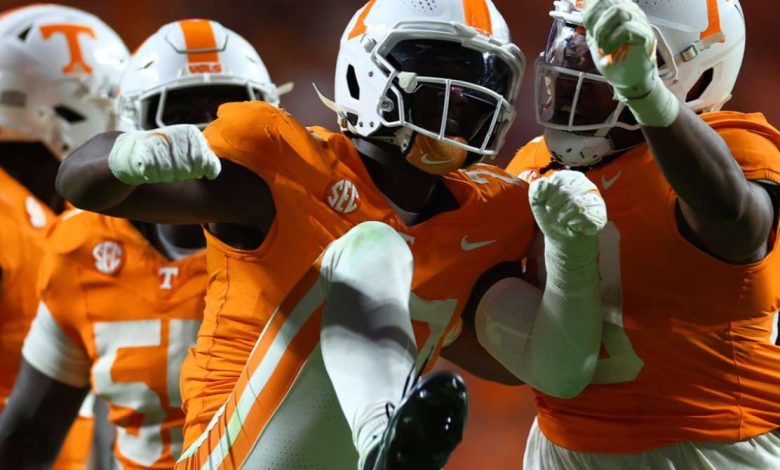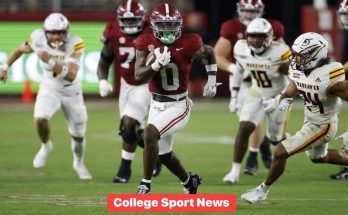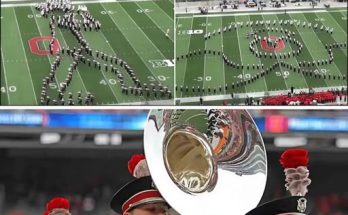In a stunning development that has sent shockwaves through the college football landscape, five-star running back Trey Cooley has decommitted from Purdue University and pledged his commitment to the University of Tennessee. This decision, announced on January 9, 2025, marks a significant victory for the Volunteers, as Cooley chose Tennessee over traditional powerhouses such as Alabama, Auburn, and Florida. The ramifications of this move are profound, not only for the programs directly involved but also for the broader dynamics of Southeastern Conference (SEC) recruiting.
The Player: Trey Cooley
Hailing from Buford, Georgia, Trey Cooley stands at 6-foot-1 and weighs 210 pounds. His senior year at Buford High School was nothing short of spectacular, amassing over 2,000 rushing yards and 30 touchdowns. Cooley’s blend of speed, agility, and field vision has earned him the distinction of being the No. 2 running back and the No. 12 overall prospect in the nation, according to 247Sports. His performance on the field has drawn comparisons to elite NFL running backs, underscoring his potential to make an immediate impact at the collegiate level.
The Decommitment from Purdue
Cooley’s initial commitment to Purdue was seen as a monumental achievement for the Boilermakers, signaling their intent to compete with top-tier programs for elite talent. However, the recruiting landscape is inherently fluid, and Cooley’s decision to reopen his recruitment underscores the complexities athletes face in making such pivotal choices. In his official statement, Cooley expressed gratitude towards Purdue’s coaching staff and fans but emphasized his need to pursue a path that aligns more closely with his personal and athletic aspirations.
Why Tennessee?
Several factors influenced Cooley’s decision to commit to the University of Tennessee:
-
Offensive Scheme: Under head coach Josh Heupel, Tennessee has implemented an up-tempo, high-octane offense that consistently ranks among the nation’s best in total yards and scoring. Cooley recognized that this system aligns perfectly with his skill set, offering him the opportunity to showcase his abilities in a dynamic environment.
-
Coaching Staff: The relationship between a player and the coaching staff is pivotal in the recruitment process. Cooley developed a strong rapport with Coach Heupel and running backs coach Jerry Mack, both of whom articulated a clear vision for his role within the team. Their commitment to his development, both on and off the field, resonated deeply with Cooley.
-
Early Playing Time: With the departure of star running back Jabari Small to the NFL Draft, Tennessee’s backfield presents an opportunity for immediate contribution. Cooley’s talent positions him as a strong candidate for significant playing time as a freshman, a prospect that undoubtedly influenced his decision.
-
Program Trajectory: Tennessee’s resurgence in recent seasons, highlighted by competitive performances in the SEC and impressive recruiting classes, indicates a program on the rise. Cooley’s commitment reflects his belief in the Volunteers’ potential to contend for championships in the near future.
Implications for Tennessee’s Recruiting Class
Cooley’s addition propels Tennessee’s 2025 recruiting class into the upper echelons of national rankings. Joining forces with five-star quarterback Jordan Miller and four-star wide receiver Jalen Carter, the Volunteers have assembled a formidable offensive trio poised to redefine the team’s identity. Analysts project Tennessee’s class to rank No. 3 nationally, trailing only Georgia and Ohio State. This surge in recruiting success not only enhances the team’s talent pool but also elevates the program’s stature among elite recruits, potentially influencing future commitments.
The SEC Recruiting Landscape
Cooley’s decision to choose Tennessee over perennial SEC contenders like Alabama, Auburn, and Florida signifies a potential shift in the conference’s recruiting dynamics. Historically, these programs have dominated the recruitment of five-star talents, leveraging their storied histories and consistent success. Tennessee’s ability to secure Cooley’s commitment suggests a leveling of the playing field, where emerging programs can effectively compete for top prospects. This development could herald a more competitive and unpredictable SEC in the coming years.
Purdue’s Perspective
For Purdue, Cooley’s decommitment represents a significant setback. As the centerpiece of their 2025 recruiting class, his departure necessitates a reevaluation of their recruiting strategy. The Boilermakers will need to identify and pursue alternative prospects to fill the void left by Cooley, a challenging task given the late stage of the recruiting cycle. This situation underscores the volatile nature of college football recruiting and the necessity for programs to remain adaptable and resilient.
Historical Context: Notable Decommitments and Flips
Cooley’s decision is reminiscent of several high-profile recruitment flips in recent years:
-
Julian Sayin: Initially considering offers from Georgia and LSU, Sayin committed to Alabama during his junior season, highlighting the Crimson Tide’s enduring appeal to top quarterback prospects.
-
Jalin Hyatt: Despite early interest and a commitment to Virginia Tech, Hyatt reopened his recruitment and ultimately chose Tennessee. Concerns about his frame led in-state programs to hesitate, but the Volunteers recognized his potential, and Hyatt rewarded their faith by delivering standout performances.
-
JoJo Earle: Originally committed to LSU, Earle flipped to Alabama, drawn by the program’s track record of developing NFL-caliber wide receivers.
-
Walter Nolen: After narrowing his choices to several top programs, Nolen committed to Texas A&M. However, he later transferred to Ole Miss, where he achieved consensus first-team All-American honors, exemplifying the unpredictable nature of recruiting and player development.
-
Keelon Russell: Committed to SMU before flipping to Alabama, Russell’s decision was influenced by relationships with the coaching staff and the program’s history of developing quarterbacks.



